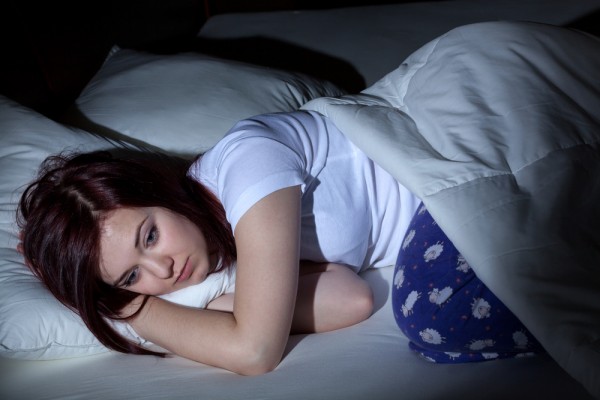https://www.girlsgonestrong.com/
Lack of sleep is the sad status quo for most of us.
Most of us perpetually feel either ‘tired and wired’ (can’t fall asleep at night), OR ‘wiped out yet waking’ (tired, but have a hard time sleeping through the night, or waking too early).
Sleep is a hormonal domino; once it goes down then come the cravings, moodiness, missed workouts, and on down the spiral we go.
I know you’ve read many a blog on “sleep hygiene”: the basics of sticking with a sleep schedule, avoiding caffeine too late in the day, using a white noise machine, and not surfing the web or checking Facebook when you should be turning in.
So, let’s talk about another aspect of sleep – hormones.
Sleep Trouble Can Mean Cortisol Trouble
Sleep problems can be more serious such as sleep apnea (although a good diet does a world of good here) or other sleep disorders, but the bulk of us are not having pathological sleep issues. Instead, we’re having cortisol issues and thus, blood sugar problems.
In a nutshell, cortisol’s job is to raise your blood sugar during any type of stress, including a fight with your boss, skipping breakfast, a spin class, etc. Your body calls on cortisol (and adrenaline) to release stored sugar to keep you going.
This is also how you can sleep through the night without having to get up and eat every few hours.
Cortisol has a natural rhythm of output: lowest at bedtime, rising throughout the night and highest around 5am.
At least, that’s what should happen. Unfortunately, many of us have abnormal secretion in terms of timing and amount of cortisol.
While cortisol’s job is to get blood sugar up, insulin’s job is to get it down.
Insulin is released when we eat, but insulin is also released when cortisol is high, because if cortisol is high then blood sugar will soon be high, too. This tug of war is happening in all of us all the time, as our body aims to keep our blood sugar just right – not too high and not too low.
Cortisol creeps up with chronic stress and with insulin resistance (like with PCOS), where cells stop responding well to insulin’s message.
They stop letting glucose easily into the cell, causing us to secrete more insulin to get the message across. Here we see higher blood sugars after we eat, along with higher insulin secretion as we release, release, release until we finally get it down.
Often, this overshoots the mark and then we need cortisol to come in and level us out. You can see where imbalance in one of these hormones quickly causes an imbalance in the other.
On the flipside, when we don’t have good cortisol reserves or a good cortisol response when our blood sugar is low, we have to rely on cortisol’s heavyweight sister to get blood sugar up: adrenaline (aka epinephrine).
Rather than having a hard time lowering blood sugar after a meal, these people have a hard time keeping blood sugar up between meals and throughout the night.
Now, back to sleep trouble.
Cortisol and, even more so, adrenaline, are stimulating hormones and can keep us awake. With insulin resistance, particularly if we stress that insulin system too much with a big dinner, or too many, or not enough carbs at our last meal, it’s easy to have higher cortisol come bed time.
This can leave us with a racing mind, having us lay awake for hours trying to fall asleep.

It can be such a frustrating experience to lie in bed for hours, watching the clock, counting the hours left before your alarm rings.
Intermittent periods of high stress can also create higher cortisol at night. If it’s too high at bedtime, we can’t wind down even though we’re exhausted. This is that ‘tired and wired’ feeling where you want to sleep, but just can’t.
With this logic in mind, wouldn’t lower cortisol be ideal for better sleep?….Sort of.
Like any hormone, cortisol has to be just right. High cortisol can keep us from falling asleep, but low cortisol throughout the night will prevent us from staying asleep.
As our adrenal glands (source of both cortisol and adrenaline) work to keep our brain, heart, and everything else going throughout the night without a food supply coming in for energy, we employ these stress hormones to keep us tapped into our sugar stores.
However, if cortisol is low our body has to rely on adrenaline to get that stored sugar free. Adrenaline is like high octane, whereas cortisol is more stimulating and it will wake you up.
Some people with lower cortisol/lower blood sugar problems wake feeling anxious, or even hungry.
Many have a really hard time going back to sleep, lying there for an hour or more unable to fall back asleep. This can mean waking frequently in the night or waking too early (e.g. up at 4 am and can’t go back to sleep).
This may sound a bit complicated, but the treatment is pretty straight forward: manage blood sugar throughout the day and sleep better, because it helps these hormones stay in a good balance.
However, while you’re working to eat regularly, ensure enough protein and veggie fiber for nice level blood sugar, and avoid sugar and alcohol (both blood sugar crashers) – you need to sleep better tonight, don’t you?
Here are a few nutrition tips for managing both sides of this troubled sleep coin:
• If you have a hard time falling asleep try a moderate carb dinner – think vegetables and protein, plus enough carbs for your UCT (your unique carb tolerance). Missing your UCT will stress your insulin mechanism and keep you wrestling with those ruminating thoughts.

An example of a moderate carb dinner could be fish or other protein, with potatoes, and a salad or veggie slaw.
• If you have a difficult time staying asleep you should consider a bedtime snack as a regular habit. This mini-meal should consist of protein, veggies for fiber, and a small amount of starch or sugar (such as 1/3 cup sweet potato or a small apple). This type of sleep issue really needs a well rounded snack closer to bedtime.
I know, I know. You’ve heard that you shouldn’t eat after dinner if you want to lose weight. You’ve heard you need an empty belly to get maximal responses from leptin, growth hormones, etc.
This is all true…in perfect physiology.
All of these higher level hormones, like leptin (a key hormone in regulating appetite and fat loss), can’t really be affected until we have a good cortisol and insulin balance.
Start there, before getting into these more nitty gritty hormones. And, guess what? Many of them normalize when we fix insulin and cortisol anyway.
Note: Blood sugar balance also drives neurotransmitter levels in the brain so even if the cause of your sleep issue is low serotonin or trouble with GABA (our best calming chemical), sorting out blood sugar will help to a large degree here also.
Many people have been so stressed for so long that this insulin:cortisol relationship is really out of balance and they have trouble with both too high and too low blood sugar.
This may warrant employing some adrenal support, such as the herb rhodiola, as well as supporting the insulin mechanism with nutrients such as chromium, magnesium, and alpha lipoic acid, plus these evening eating strategies.
What To Do When Eating Right Isn’t Enough
Often these nutrition guidelines are enough, but sometimes our adrenal and blood sugar systems are so stressed that we need to follow these rules and employ natural sleep aids, or even sleep medications, to get a good night’s sleep.
Sleep remedies abound at your local natural food market, but what should you take?
There are a few things to skip if you have certain conditions and below you’ll find a guide for which products, herbs, and nutrients may work better for you depending on your particular flavor of sleep trouble.
Think Twice Before Going For Daily Melatonin
While melatonin is sold freely over the counter, don’t forget this is a hormone, meaning it is a powerful messenger to your body.
When we take melatonin our body can’t gauge how much melatonin it needs to make on its own so it slows, and eventually almost halts, its own melatonin production.
Melatonin is meant to be taken just for 3 days or so; thus, is ideal for travel, especially across time zones, but not a good idea to take daily.

While melatonin may be a great short term help, it is not an effective long-term solution to optimal hormone balance.
I know many fitness gurus tout the benefits of daily melatonin but if you understand how it shifts the immune system, interacts with other hormones, and shuts down your internal melatonin production, it is a terrible idea, in my opinion.
Getting your own melatonin production and rhythm out of whack from taking it daily is a problem because melatonin and cortisol regulate each other. These two hormones have opposite rhythms and timing of release (cortisol is high in the morning, lower at night and melatonin is opposite of that).
As we shut down our own melatonin release from daily use, we will cause cortisol abnormalities and quickly both stress and blood sugar issues arise as well.
Never forget that your hormones are a tightly knit web. When cortisol is off, soon thyroid, female hormones, fat loss, immune system, and more all get out of balance.
And, because so many women have Hashimoto’s or other autoimmune diseases, it’s absolutely important to respect the immune system when it comes to supplements like melatonin.
Here’s the deal:
Both cortisol and melatonin have profound effects on your immune system. Cortisol is usually deemed as “bad” while melatonin is often touted as “good” for the immune system. Good and bad are relative depending on your particular shifts towards one arm of the immune system (known as the TH1 or TH2).
Everyone with an autoimmune disease has an imbalance towards TH1 or TH2. The problem is you probably don’t know which one (there are not great lab tests to discern this for you).
Cortisol stimulates TH2 and melatonin stimulates TH1, so if you have a dominance of TH1 you will make your autoimmune attack on your tissues much worse by taking melatonin.
So, you can see, the advice of using melatonin daily as a sleep aid or “immune booster”, even though these claims may be true, even research based, isn’t wise.
If you have autoimmunity, avoid “immune boosting”, or, “immune supporting” supplements as they can increase your immune based attack (e.g. on the thyroid in Hashimoto’s). This includes melatonin.
Autoimmunity puts you in a ‘special class’, ladies. Remember that when you read nutrition and health advice.
The best strategy is to boost YOUR own internal melatonin production. Here’s how you do it:
- Keeping lights low in the hours before bedtime, and keep sleeping environment as dark as possible.
- Because serotonin is the precursor for melatonin, utilize serotonin boosting supplements like 5HTP and methylating nutrients such as B12, folic acid, B6, etc to boost serotonin.
- Address any cortisol issues (high or low) as your body makes melatonin by trying to coordinate with cortisol’s rhythm.
If you’ve been taking melatonin for years you may not be able to sleep without it. If you try and just can’t manage, then we know your own melatonin production and rhythms are disrupted and can assume you have some cortisol and blood sugar issues because of it.
In this case, you may simply need to stay on the melatonin to be able to sleep.
Increase GABA & Serotonin – Your ‘Wind Down’ Brain Chemicals
Your main natural calming neurotransmitters are GABA and serotonin (largely because it gets converted into melatonin).
Having enough activity of these guys helps you relax and unwind, countering some of the effects from cortisol abnormalities. Sometimes while you’re working on setting blood sugar and cortisol issues straight, you need to boost nature’s chill pills to get some zzzs.
Many herbal “bedtime” teas have GABA boosting herbs. Teas are a tried and true way to use herbs but keep in mind these are low dose, so tea alone may not be enough for some of you. However, it’s a simple and cozy way to turn in so try a strong tea (start with 2 bags and increase to 4 if you aren’t getting relief).

Having a cup of herbal tea as part of your nighttime wind down routine, can be a great addition.
If you have a hard time staying asleep, (lower blood sugar issues) try:
- Yogi Tea with valerian, chamomile, passionflower and skullcap, as well as a bit of licorice.
- Calm chamomile tea, from Tazo – a classic. Calm has lemongrass for a different twist and a touch of licorice as well.
If you have a hard time falling asleep, (struggle with higher blood sugar) try:
- Get Some ZZZs tea, from Republic of Tea. Roobios base with valerian, passionflower, and chamomile.
- Tulsi Chamomile Tea. Tulsi is a great herb for managing high cortisol, making this a great tea for trouble falling asleep.
When teas aren’t enough, here’s a few supplement ideas to affect these GABA & Serotonin:
- Herbs that boost GABA include: Valerian, Chamomile, and passionflower (my calm+sleep fits this bill).
GABA deficiency signs include:
- Feeling anxious or panicked or overwhelmed for no reason.
- Feeling knots in stomach, dread or doom; inner tension or excitability that’s difficult to turn off.
- Mind feels restless and you can’t turn it off when you want to relax.
- Worry or guilt about things that didn’t used to bother you.
Herbs and nutrients that boost Serotonin include: St John’s Wort, 5HTP, and SAMe.
Serotonin deficiency signs are:
- Depression that feels guilty (life isn’t so bad, you feel guilty that you aren’t more happy), the “blues”.
- Losing enjoyment and pleasure from things you used to enjoy.
- Feel more susceptible to pain and get angry more than before even when unprovoked.
- Feel worse in grey, overcast weather.
Other Relaxing Nutrients for Better Sleep
These three calming nutrients work for any type of sleep issue and can easily be combined with teas or herbs above:
- Magnesium: Try 300-400mg (many of us are very deficient in magnesium and need to use this dose several times per day).
- Inositol can be relaxing and is also great for female hormone issues of many sorts. Try 500-1000mg at bedtime.
- Theanine is the relaxing amino acid found in green tea. Try 100-300mg at bedtime (found in calm+sleep).
Nighty, night! Zzzzzz……
Filed under: Fitness

 For now classes are 6pm and 640pm at 2840 Wildwood st in the Boise Cloggers studio.
Book your class NOW!
click this ==>
For now classes are 6pm and 640pm at 2840 Wildwood st in the Boise Cloggers studio.
Book your class NOW!
click this ==>








